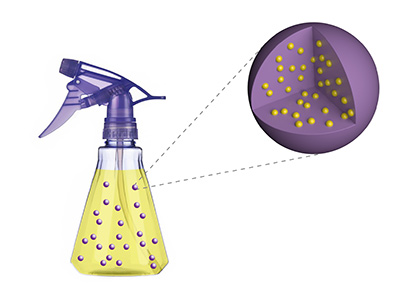The Catalan Institute of Nanoscience and Nanotechnology's BIOCIDE2LIFE project used encapsulation technologies to develop a new generation of disinfectants for short- and long-life antimicrobial action. These disinfectants have the potential to considerably reduce incidence of hospital-acquired infections.
- 21 September 2018
Through this project, a stable, cost-effective and easy to up-scale prototype was developed, showing excellent results in terms of immediate and long-life biocidal activity. The technology was licensed to a private company through a technology transfer agreement, and subsequently patented.
Hospital-acquired infections such as surgical wounds, and urinary and respiratory tract infections affect an estimated 4.1 million people in the EU each year, directly causing some 37 000 deaths and contributing to an additional 110 000. Such infections mainly occur in intensive care units and acute surgical and orthopaedic wards, and are caused by micro-organisms including bacteria, viruses, fungi, yeast and parasites. About 9 % of hospital patients are affected.
It is vital to reduce the number of such micro-organisms and minimise risks to patients through use of disinfectant on surfaces and antiseptics on the skin.
Immediate and longer-term action
The EU-funded BIOCIDE2LIFE project sought to address this need through free biocides that act immediately and micro- and nano-encapsulated biocides that act over longer periods (up to 12 hours), while remaining effective after as many as five instances of recontamination. It also aimed to ensure that the product would be non-irritant, non-toxic and invisible once applied to a surface and prevent cross-contamination between hands and surfaces. Given the high demand for disinfectant, with the large number of companies and high levels of turnover in the sector, the product had to be cost effective, user friendly, easy to scale-up for mass production and stable during storage and transport for at least two years.
Two post-doctoral researchers were hired to take part in the project under which several encapsulated biocides were developed and testing of the performance and stability of the prototypes was carried out. The prototypes were then optimised to arrive at the minimum biocide concentration level required for the disinfectant to be effective in the short and longer term. This led to development of an advanced generation of disinfectants that combined the immediate action of a free biocide with the longer-term effectiveness of an encapsulated biocide in a single product.
An attractive product for commercialisation
The project's results have attracted the attention of world-leading companies in the field of hospital disinfection. Studies regarding patenting showed that the products could be commercialised worldwide without infringing intellectual property rights.
An agreement for transfer of the technology was signed with a private company in Catalonia, thus contributing to the dissemination of a new and innovative product. Additional work under the project involved optimisation of the production process for industrial scale-up, as well as design of a facility and acquisition of equipment to enable mass production of the disinfectant, which was tested in hospitals in Catalonia. Further validation took place in international laboratories in preparation for the commercial launch of the products.
Total investment and EU funding
Total investment for the project “BIOCIDE2LIFE - Micro- and Nano-encapsulated Biocides: the next generation of Disinfectants with Short + Long-2Life Antimicrobial Activity” is EUR 320 874, with the EU’s European Regional Development Fund contributing EUR 152 387 through the “Catalonia” Operational Programme for the 2007-2013 programming period.

